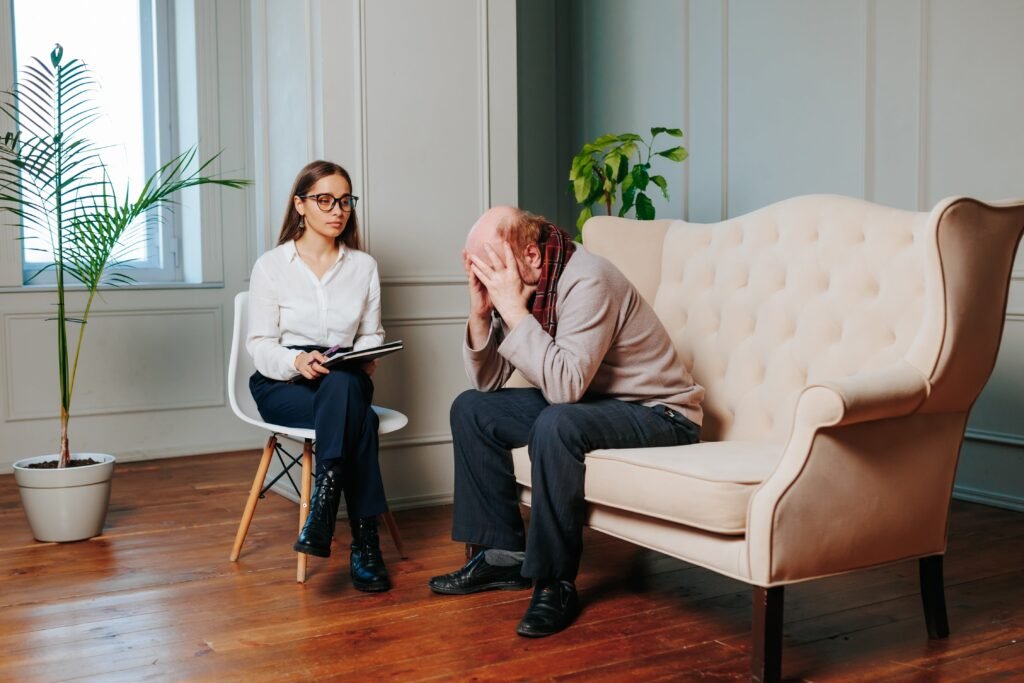Anxiety Counseling in Edmonton
Counselling for Anxiety
Anxiety is a common mental health condition that affects millions of people worldwide. It can manifest in various ways, such as excessive worrying, panic attacks, or a constant feeling of unease. While anxiety can be overwhelming and disrupt daily life, there is hope for those seeking relief. Anxiety counselling is a powerful tool that can help individuals understand and manage their anxiety effectively. In this blog, we will delve into what anxiety counselling is and explore the ways it can provide support and guidance to those struggling with anxiety. Whether you are personally dealing with anxiety or know someone who is, this article will shed light on the benefits of anxiety counselling and how it can help you regain control of your life.

Types of Anxiety Disorders
Generalized Anxiety Disorder (GAD) is a common mental health condition that affects millions of people worldwide. It is characterized by excessive worry and heightened anxiety about various aspects of life. Individuals with GAD often find themselves constantly anticipating the worst possible outcomes, even in situations that others may perceive as harmless or non-threatening.
These worries can be all-consuming and can significantly impact a person’s daily life, making it difficult to concentrate, sleep, or enjoy activities they once found pleasurable. Social Anxiety Disorder (SAD), on the other hand, involves an excessive fear of social situations and a strong desire to avoid them. People with SAD may feel intense anxiety in social gatherings or when interacting with others, fearing judgment, embarrassment, or rejection. This fear can be paralyzing and may lead to avoidance behaviors, such as declining invitations or isolating oneself from social interactions. Panic Disorder is another common anxiety disorder characterized by recurrent panic attacks. These attacks are sudden episodes of intense fear accompanied by physical symptoms such as rapid heart rate, shortness of breath, sweating, and trembling.
They can be extremely distressing and may occur unexpectedly, making individuals worry about when the next attack will happen. Finally, specific phobias involve an intense and irrational fear of a specific object or situation. Common phobias include heights, spiders, flying, needles, and enclosed spaces. When faced with their phobic trigger, individuals may experience extreme anxiety, panic, and an overwhelming urge to escape. Understanding these various anxiety disorders is crucial in order to provide appropriate and effective counselling for individuals struggling with anxiety. Understanding Anxiety Counselling: What it is and How it Can Help You provides insight into how anxiety counselling can support individuals in managing and overcoming these challenges
Developing Coping Mechanisms
Coping mechanisms are strategies individuals use to handle stress, anxiety, and other challenges. In anxiety counselling, clients are taught healthy coping mechanisms, such as deep breathing exercises, mindfulness techniques, and positive self-talk. These techniques provide individuals with practical tools to interrupt anxious thoughts and calm their minds.

The therapist helps clients explore and practice these coping mechanisms to manage anxiety symptoms effectively. Through guidance and support, individuals can strengthen their coping skills, enabling them to navigate stressful situations with greater ease. It is important to note that developing coping mechanisms is an ongoing process that requires practice and commitment outside of counselling sessions. Regular practice helps individuals integrate these strategies into their daily lives and build resilience against anxiety triggers.
Mukesh Mishra
Clinical Therapist
Our team of specialists is dedicated to helping individuals seeking counselling .Meet Mukesh Mishra, a qualified professional with a Master’s Degree in Clinical Social Work. As a registered Clinical Social Worker and Certified CBT and DBT Therapist, Mukesh brings a wealth of knowledge and expertise to his practice. With additional training in EMDR and Mindfulness-Based Counseling, he provides a holistic approach to Individual therapy. With over five years of experience in private practice and community settings, Mukesh is committed to making a positive impact in the field. Join us on this journey towards a healthier and happier life!


Qualifications and Experience
Anxiety counsellors play a crucial role in helping individuals manage and overcome their anxiety challenges. These professionals typically have a degree in psychology, counseling, or a related field, along with specialized training in anxiety disorders and therapy techniques. Some may even hold certifications in specific therapeutic approaches, such as cognitive-behavioral therapy (CBT) or solution-focused brief therapy (SFBT).
When seeking anxiety counselling, it is important to choose a qualified counsellor who is licensed or certified in their respective field and has experience working with clients with anxiety disorders. A skilled anxiety counsellor will create a safe and non-judgmental environment for clients to explore their concerns and provide evidence-based treatment. This ensures that individuals receive the support and guidance they need to effectively manage their anxiety and improve their overall well-being.
How to Find the Right Anxiety Counsellor
Finding the right anxiety counsellor can be a challenging task, but it’s crucial for your mental well-being. Start by researching and gathering information about different anxiety counsellors in your area. Consider their qualifications, experience, and specialized training in anxiety disorders before making a decision. It’s important to find a counsellor who is knowledgeable and experienced in dealing with the specific challenges of anxiety.

Once you have narrowed down your options, schedule an initial consultation to get a sense of their approach and determine if they’re a good fit for you. This meeting allows you to ask questions, share your concerns, and gauge the therapist’s compatibility with your needs and personality. Remember, finding the right anxiety counsellor is essential in ensuring that you receive the support and guidance you need to effectively manage and overcome your anxiety.

What to Expect in Your First Anxiety Counselling Session
During your first anxiety counselling session, the therapist will begin by asking you about your symptoms and how they have been impacting your daily life. This is an important step in understanding the extent of your anxiety and determining the most effective approach to treatment. The therapist’s goal is to establish a rapport with you and create a safe and non-judgmental environment where you can openly share your thoughts and feelings. They may also ask you to complete a questionnaire or assessment, which helps them gain a better understanding of your anxiety and its severity.
In addition, the therapist will take the time to explain the counselling process to you, including the frequency and duration of sessions, confidentiality, and boundaries. This helps to create a sense of clarity and allows you to feel more comfortable and informed throughout your counselling journey.
Is Anxiety Counselling Right for You?
If you find yourself constantly consumed by worry or fear, anxiety counselling can be a beneficial tool to help you navigate through these overwhelming emotions. When your anxiety begins to negatively impact your daily life and relationships, seeking counselling might just be the helpful option you’ve been searching for. By providing a safe and non-judgmental space, anxiety counselling allows you to openly explore your thoughts and emotions that are directly linked to your anxiety. Through these sessions, you can learn coping mechanisms and effective strategies to manage your anxiety, empowering you to regain control over your life and improve your overall well-being.
Common Techniques Used in Anxiety Counselling
Cognitive Behavioral Therapy (CBT) is a commonly used technique in anxiety counseling, aimed at helping individuals recognize and modify negative thought patterns and behaviors that contribute to their anxiety. By identifying and challenging irrational thoughts, individuals can learn to replace them with more logical and positive thoughts, reducing anxiety symptoms. Exposure therapy is another effective technique used in anxiety counseling, where individuals are gradually exposed to their fears in a controlled and safe environment. This helps them confront and overcome their anxiety by desensitizing themselves to the triggers. Relaxation techniques, such as deep breathing exercises and progressive muscle relaxation, are often taught in anxiety counseling to help individuals manage their anxiety symptoms. By practicing these techniques regularly, individuals can experience a calming effect on their mind and body, reducing anxiety levels. Mindfulness meditation is also a technique utilized in anxiety counseling, focusing on bringing one’s attention to the present moment without judgment. This practice encourages individuals to observe their thoughts and feelings objectively, allowing them to develop a greater awareness of their anxiety triggers. Overall, these techniques used in anxiety counseling can provide individuals with valuable tools to manage and alleviate their anxiety effectively.
Frequently Asked Questions
What is anxiety counselling?
Anxiety counselling is a form of therapy that focuses on helping individuals understand and manage their anxiety. It involves working with a trained therapist who can provide support and guidance in navigating the challenges associated with anxiety. The goal of anxiety counselling is to identify the root causes of anxiety and develop effective coping mechanisms to reduce its impact on daily life. Through counselling, individuals can gain a better understanding of their anxiety triggers and learn techniques to effectively manage and overcome anxiety symptoms. By addressing the underlying issues, anxiety counselling can provide individuals with the tools and support they need to regain control over their lives and improve their overall well-being.
How can anxiety counselling help me?
Anxiety counselling offers a safe and non-judgmental environment where you can openly express your feelings and concerns. It provides you with an opportunity to explore the root causes of your anxiety and gain a deeper understanding of how it affects your life. By working with a counsellor, you can learn effective coping strategies and techniques to manage and reduce your anxiety symptoms. The counsellor will collaborate with you to develop a personalized treatment plan that addresses your specific needs and goals. Together, you can embark on a journey towards healing and regaining control over your mental well-being.
What techniques are used in anxiety counselling?
In anxiety counselling, one commonly used technique is Cognitive Behavioral Therapy (CBT), which aims to help individuals identify and challenge negative thought patterns that contribute to their anxiety. By recognizing and modifying these thoughts, individuals can replace them with more positive and logical ones, ultimately reducing their anxiety. Exposure therapy is another effective technique used in anxiety counselling. This approach involves gradually exposing individuals to their fears in a safe and controlled environment, allowing them to confront and overcome their anxiety triggers. Additionally, relaxation techniques, such as deep breathing exercises and progressive muscle relaxation, are often taught in anxiety counselling to help individuals manage and reduce their anxiety symptoms. These techniques create a calming effect on the mind and body, promoting relaxation and reducing anxiety levels. Furthermore, mindfulness-based techniques, including meditation and grounding exercises, are utilized to help individuals stay present and alleviate anxiety. By developing a greater awareness of their anxiety triggers and practicing mindfulness, individuals can effectively manage their anxiety and improve their overall well-being.
How long does anxiety counselling typically last?
The duration of anxiety counselling can vary greatly from person to person, as it is tailored to meet individual needs. On average, anxiety counselling can last anywhere from a few weeks to several months. The length of counselling may be influenced by the severity of the anxiety symptoms and the progress made during therapy sessions. It’s important to remember that anxiety counselling is a personalized process, and the duration of treatment may be adjusted as needed. The therapist will work closely with you to determine the most effective and appropriate length of counselling in order to support your journey towards managing and overcoming anxiety.
Anxiety counselling can be a valuable tool in helping individuals understand and manage their anxiety. By working with a qualified and experienced counsellor, individuals can gain a better understanding of their specific anxiety disorder and develop coping mechanisms to effectively manage their symptoms. The benefits of anxiety counselling are numerous, including improved daily functioning, enhanced relationships, and overall increased well-being. It is important to find the right anxiety counsellor for you, as a strong therapeutic relationship is crucial for success. During the first counselling session, individuals can expect to discuss their symptoms and receive an explanation of the counselling process. Common techniques used in anxiety counselling, such as Cognitive Behavioral Therapy (CBT), exposure therapy, relaxation techniques, and mindfulness meditation, can provide individuals with valuable tools to manage and alleviate their anxiety effectively. If anxiety is negatively impacting your daily life and relationships, seeking anxiety counselling may be the right choice to regain control over your life and improve your overall well-being. Book an appointment for anxiety counselling today .
